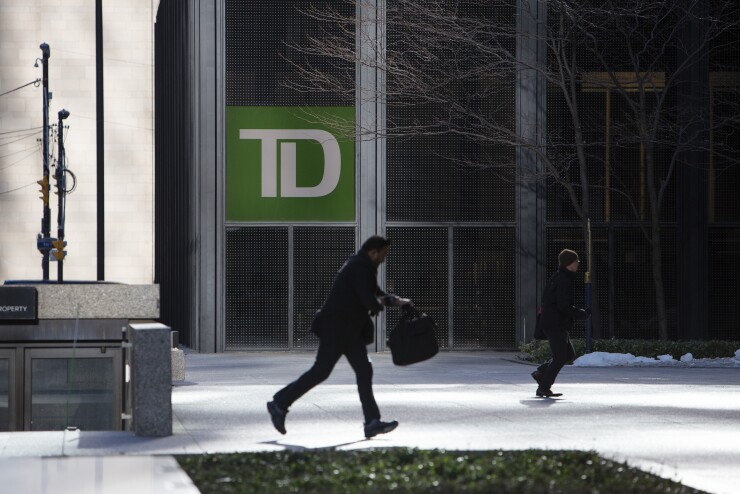
UPDATE: This article includes Leo Salom's comments about investing in and executing TD Bank's anti-money-laundering program.
TD Bank Group's anti-money-laundering failures led to a loss in the third quarter as
The Toronto-based bank set aside $2.6 billion last quarter, while lower deposit volumes and loan margins tamped down on revenue from its American business, the bank said Thursday.
It was the bank's first quarterly net loss since the fourth quarter of 2002.
On an adjusted basis, TD posted earnings of CA$2.05 a share, just below analyst consensus estimates of CA$2.08 a share.
"TD delivered record revenue and net income in Canadian personal and commercial banking, continued operating momentum in the U.S., and strong results across our markets-driven businesses," President and CEO Bharat Masrani said in a prepared statement.
The bank's stock was down 3.5% Thursday morning, recently trading at $57.66 on the New York Stock Exchange.
Investor concerns about the potential impact of the bank's AML fiasco — which the
Along the way, the bank has reported that it had rooted out the cause of its compliance malfunctions and had spent $500 million to fix them, along with taking a $450 million provision for potential penalties earlier this year. TD said Wednesday night that it expected its regulatory issues to be resolved by the end of the year, although it also expects non-monetary consequences, which could put pressure on its growth strategies.
Masrani said on the company's third-quarter earnings call that although the failures were "serious," the bank has advanced on all fronts to rectify its compliance, including by hiring new leadership and investing in data and technology.
"While we are not through the tunnel yet, we can see the light at the end of this journey," Masrani said. "While there's still much work ahead, we are pleased with the progress we've made. This is a priority. Our U.S. business is an important part of the bank and of our future."
He said the bank couldn't provide more details about the AML failures or potential non-monetary penalties.
Revenue rose to CA$14.17 billion from CA$12.91 billion a year ago, compared with analysts' expectations of CA$12.69 billion, lifted in part by higher fee income
Net interest income rose about 4% from the prior year to CA$7.58 billion, even as tepid operations in the States idled. The U.S. retail arm of the bank pulled in net interest income of $2.14 billion, a mild decrease from $2.16 billion a year ago. TD's home country personal and commercial business saw CA$4 billion in net interest income, up from CA$3.57 billion the prior year.
Non-interest income gained more than 17% to CA$6.6 billion, boosted by the Wealth Management and Insurance segment, which saw higher insurance premiums, fee-based revenue and transaction revenue.
Provisions for credit losses rose about 40% to CA$1.07 billion, though stayed relatively stagnant from the second quarter.
In addition to the provisions for the possible AML penalties, the bank incurred CA$110 million in restructuring charges, mostly related to employee severance and the sale of real estate assets. The company
The $2.6 billion provision compressed TD's common equity tier 1 ratio, which decreased from 13.4% to 12.8% in the third quarter. The bank sold 40.5 million shares in Charles Schwab to soften the hit to its capital, which has steadily decreased over the last year due to share buybacks, increased risk-weighted assets, its restructuring program and regulatory assessments and provisions.
Masrani said on the call that the bank wants to be conservative with its capital position, and targets a CET1 ratio of between 12% and 12.5%, though the regulatory minimum is 11%.
"The bank likes to be well-capitalized and, frankly, likes to carry more capital than what may generally be necessary. In line with that, we think it's prudent to have capital.There is still a lot of volatility. Economic conditions are not as predictable as one would like."
Peers such as Bank of Montreal, Bank of Nova Scotia and CIBC maintain capital ratios around 13%.
The Toronto-based bank also expects a "global resolution" of investigations by U.S. authorities to be finalized by the end of the year.
In a Thursday note before the earnings call, Jefferies analyst John Aiken said that TD came in modestly below expectations even outside of the AML provisions, but the projected capital rebuild should mitigate any initial market downside.
The provision adds to doubts about TD's ambitions for U.S. expansion. Leo Salom, who leads the bank's American retail operations, said investing in governance is a priority for the company while still growing its state-side presence. Salom said the bank is moving as quickly as it can to ensure that it has mature infrastructure in place, and he believes TD is "well underway" on investing in and executing its AML program.
"There's no doubt that as we execute on some of these programs from a governance control standpoint, there could be some elevated expenses," Salom said. "I'm comfortable with that because I want to drive to that sustainable platform in the U.S. We have such a signature differentiated platform, we want to make sure that we've got the license and the capability to continue to grow at scale."
The bank has been reducing its headcount through previously announced layoffs, "optimizing" its branch footprint and simplifying its data architecture so that it can invest in its U.S. franchise, he said.
Plus, economic shifts may provide a windfall, as projections that the Federal Reserve will cut rates this fall become more certain. Salom said consumers and businesses may feel less financial pressure, leading to a spark in loan demand.






